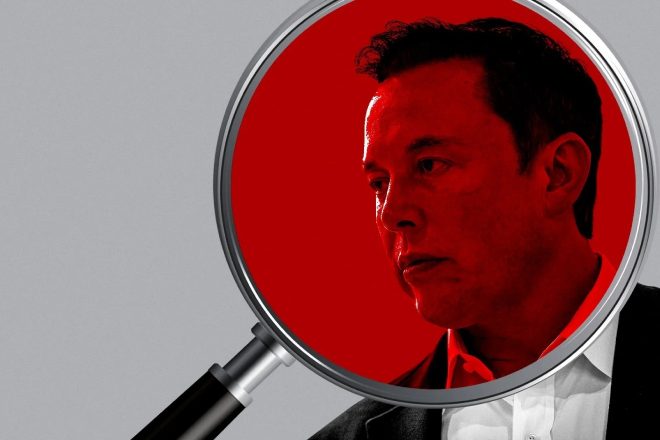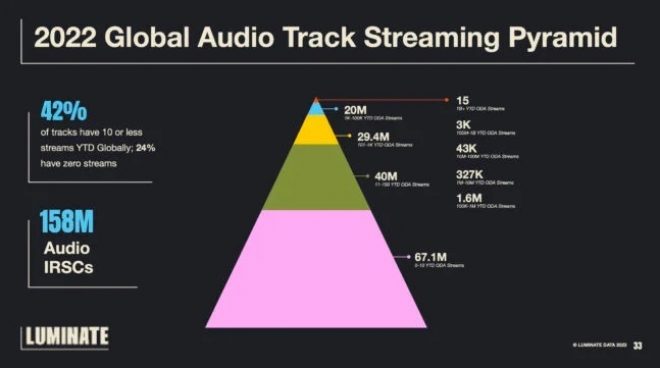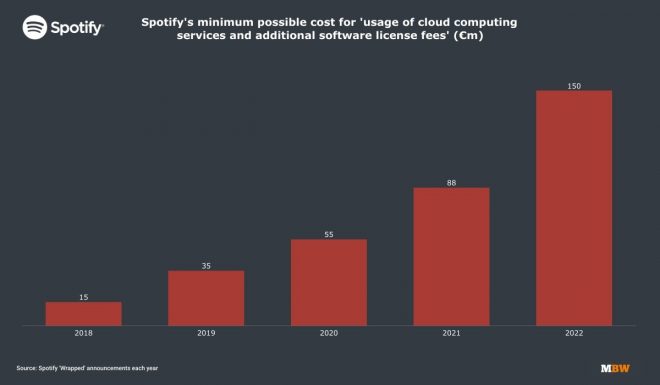38 million tracks on music streaming services were played zero times in 2022
Is there a risk that streaming giants take a leaf out of Elon Musk’s book?

In a recent presentation at SXSW, Rob Jonas, CEO of Luminate, an entertainment market monitor and insights provider, unveiled a startling statistic: nearly a quarter (24%) of the 158 million audio tracks available on music streaming services in 2022 went completely unplayed.
That's approximately 38 million tracks with zero plays worldwide. Furthermore, about 42% of the entire catalog of tracks on these platforms, or 67.1 million songs, received 10 or fewer streams each during the same period.

This striking fact begs the question of how streaming giants like Spotify and Apple Music cover the significant costs of cloud storage facilities. Currently, the companies’ revenues come from three primary sources: advertising, subscriptions, and on-service marketing fees paid by the music industry. However, the growing expense of cloud hosting services is putting pressure on streaming platforms’ margins.
For instance, Spotify refrains from disclosing the exact yearly expense of Google cloud storage in their financial reports. However, they do reveal the annual increase in company costs for ‘usage of cloud computing services and additional software license fees’. Using this information, MBW has estimated the minimum annual cost of Google's cloud storage services and other software licenses for Spotify. Within a short span of four years, the cost amounting 15 million Euros swells to a staggering 150 million Euros, as shown below.

There is a solution that may create a dilemma being considered, which would involve transferring the cloud hosting costs directly onto artists, specifically targeting those whose tracks garnered little to no streams. At present, streaming giants’ financial relationship with artists is mediated by distributors and record companies. A direct distribution relationship with artists, such as the one launched by Spotify in 2018 and subsequently shut down due to pressure from major record companies, could reportedly enable them to bill artists for essential B2B services.
In recent years, platforms like SoundCloud and TikTok's SoundOn have launched their own DIY distribution offerings for music artists. In the midst of a rapidly evolving landscape, the prospect of music streaming giants like Spotify and Apple Music re-entering the music distribution market could very well become one of the most hotly debated and contentious topics in the near future.
As Twitter users reinstate mobile/SMS two-factor authentication with the requirement of a monthly subscription payment to Elon Musk, a new trend may be emerging in the Internet industry. Music streaming giants could potentially explore monetising essential services that artists have long enjoyed without charge.
Read these next:
Pioneer DJ upgrade rekordbox iOS app making your DJ setup portable
The 13 best earplugs to protect your hearing in the rave
Google Assistant can reportedly detect samples "Less than a second long"
Ableton launches new iOS app, ‘Note’


